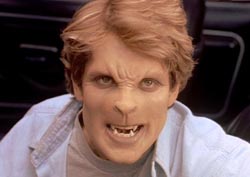
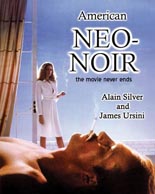 Authors of more books on film noir than you have pairs of underwear, Alain Silver and James Ursini now turn their attention to American Neo-Noir in their latest trade-paperback collaboration for Applause Theatre & Cinema Books.
Authors of more books on film noir than you have pairs of underwear, Alain Silver and James Ursini now turn their attention to American Neo-Noir in their latest trade-paperback collaboration for Applause Theatre & Cinema Books.
Following the close of the “classic noir” period with Orson Welles’ Touch of Evil in 1958, neo-noir is loosely defined as the next step of the genre — one that embraces the motions of and comments upon its preceding movement. Silver and Ursini weave their way through its history, right up to today, nimbly moving from one title to the next with sheer unpredictability.
They tackle their subject here not chronologically, but thematically, with chapters devoted to fugitive couples, director duos, the femme fatale and so on. Along the way, they codify such sub-subgenres as “rap noir,” “kid noir” and “Native American noir,” somehow without sounding silly.
Their style always has been a delicate balance between the academic and the accessible, and here, that means Fyodor Dostoyevsky is as likely to pop up as a reference as Alfred Hitchcock, that Stakeout and Stripped to Kill merit as much consideration as Taxi Driver and Thief. As you wonder what something like Spring Breakers or, God forbid, Cyborg 2 is doing here, the authors will tell you and make it seem perfectly natural. While Silver and Ursini are not about to turn in their scholar-credibility cards by placing ’80s action-movie he-man Chuck Norris on a pedestal as a paragon of neo-noir, they will tell you the film in which he gets closest to it.
Roughly the final fourth of the book is an exhaustive filmography of some 500 titles — a helpful feature carried over from their previous (and also recommended) Applause genre surveys, including The Zombie Film and The Vampire Film. Design of this volume is also similar, in that the text (in a sans serif typeface I find too primitive) is supplemented by a wealth of still photos.
Incidentally, captions for those pics contain many innocent typos and outright factual errors, from misidentifying 1997’s forgotten David Duchovny vehicle Playing God as Playing Code to confusing Robert Mitchum with the comparatively towering Jack O’Halloran (and dropping the “O’” from the latter’s surname). Although the main text itself doesn’t sport as many boo-boos, the book overall could have used another eagle-eye to ensure the fifth Dirty Harry movie, The Dead Pool, didn’t appear as The Drowning Pool (being the true title of a Paul Newman film also covered within).
Since American Neo-Noir discusses a few titles as recent as January’s Jennifer Lopez thriller The Boy Next Door, I wonder if perhaps the book’s production cycle were rushed, which could account for such flubs. Ultimately, it matters not, because once more, Silver and Ursini have delivered yet another wholly readable, instantly addictive long-form essay on a genre beloved by moviegoers who may not know it’s a genre at all. They can now, emerging with a greater understanding … and an overbrimming Netflix queue. —Rod Lott

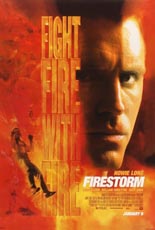
 In what has to be the orangest movie ever made, former NFL defensive end turned Radio Shack pitchman Howie Long has his first — and thankfully only — vehicle as an action hero. He’s Jesse Graves, one of an elite crack team of “smokejumpers,” those specially trained firefighters who parachute into raging blazes in forests and other wildlife sites.
In what has to be the orangest movie ever made, former NFL defensive end turned Radio Shack pitchman Howie Long has his first — and thankfully only — vehicle as an action hero. He’s Jesse Graves, one of an elite crack team of “smokejumpers,” those specially trained firefighters who parachute into raging blazes in forests and other wildlife sites.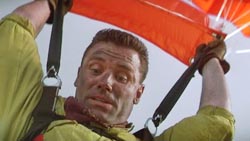

 Rob Corddry does a good job of playing a total jerk. Too good, in fact — like, the Laurence Olivier of assholes — and it makes
Rob Corddry does a good job of playing a total jerk. Too good, in fact — like, the Laurence Olivier of assholes — and it makes 
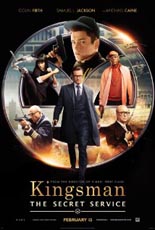
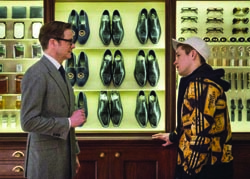
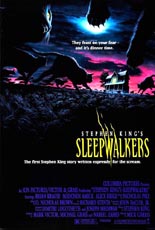
 Where, oh, where would Mick Garris be without Stephen King? The unemployment line? (I’m asking for a friend.) The number could change between the time I hit the “publish” button and this sentence hits your eyes, but Garris has directed seven movies scripted by and/or adapted from the superstar horror author’s work. Although Garris already had achieved mild acclaim with his two first features, 1988’s
Where, oh, where would Mick Garris be without Stephen King? The unemployment line? (I’m asking for a friend.) The number could change between the time I hit the “publish” button and this sentence hits your eyes, but Garris has directed seven movies scripted by and/or adapted from the superstar horror author’s work. Although Garris already had achieved mild acclaim with his two first features, 1988’s 